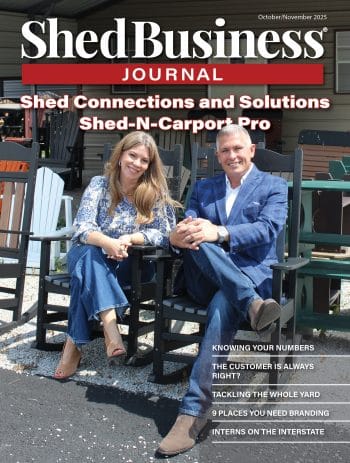What Coverage is Needed for Proper Protection

Shed manufacturers and dealers are frequently asked by their customers, “What insurance does my shed need?” Their most common response is while coverage amount varies from policy to policy, with limitations on damages, most sheds on their property are protected under their homeowner’s standard insurance policy.
But what kinds of insurance do shed builders, dealers, and haulers need to be covered?
Whether you’re constructing a simple storage shed or creating a bespoke garden office, accidents can happen at any moment. From heavy timber falling and causing injury to a customer, to accidentally damaging underground pipes while laying shed foundations, the potential for costly claims is always present.
WHAT DOES YOUR INSURANCE DO?
What does insurance do for shed builders, dealers, and haulers? A lot of risk surrounds the shed industry, but insurance can be a crucial management tool that allows operators to transfer that risk away from the organization. With so many moving parts in the shed operation, it is important that you be prepared for things to go wrong, from the manufacturing process to the delivery.
Tanner Wagner, client advisor for Acrisure, Midwest division, in Grand Rapids, Michigan, says shed business insurance serves several functions:
- Risk Management: It minimizes an organization’s exposure to significant financial losses, thereby preserving capital for essential business operations and growth initiatives instead of spending it on covering unexpected costs.
- Budget Certainty: By utilizing insurance tools, companies working in the shed industry can stabilize costs related to potential losses, enabling more accurate budget forecasting and allocation. This certainty enhances strategic decision-making concerning investments in innovation, infrastructure, or expansion.
- Focus on Core Operations: A robust insurance cushion allows shed operators to concentrate on their primary business objectives, reducing worries about unforeseen financial setbacks. This increased confidence supports ambitious project planning and execution.
- Investment in Safety and Compliance: Resources can be strategically allocated to improve operational safety protocols and compliance measures. This proactive approach can indirectly decrease the probability and impact of future losses by reducing risks.
“Overall, insulating shed operators against large losses through effective insurance products provides a secure foundation for long-term growth and strategic planning, enhancing an organization’s ability to build value and maintain stability,” Wagner adds.
TYPES OF SHED BUSINESS INSURANCE
Depending on the nature and scale of your shed business, you might need various types of insurance, such as liability insurance, property insurance, or workers’ compensation insurance.
Many of the recommended coverages are universal across builders, dealers, and haulers, and Wagner lists them.
General Liability Insurance: Essential for protecting against claims related to bodily injury, property damage, and personal injury. This fundamental coverage defends against potential lawsuits. It safeguards against claims made by an employee or former employee who suffers injury, harm, or illness as a result of working for you. $1 million per occurrence is a minimum recommendation
Commercial Property Insurance: Covers damage to physical assets such as buildings and equipment, providing protection against incidents like fire, theft, or vandalism. Coverage limits can vary widely, depending on the size of the operation
Commercial Auto Insurance: Proper coverage for a hauler’s fleet is crucial, for both physical damage and liability. Commercial auto insurance cost can vary depending on:
- Your insurance history.
- The number of vehicles you have.
- The types of vehicles you have.
- How you use your business transportation.
- The limits you choose.
Product Liability Insurance: Important for manufacturers and retailers, this covers liability from defective products that cause harm. This can include legal fees and compensation costs.
Workers’ Compensation Insurance: Typically required by law, this covers medical expenses and lost wages for employees injured on the job. It can also cover retraining, permanent injury, and employers’ liability.
Umbrella Insurance: Offers extra liability coverage beyond existing policies, safeguarding against large claims. A $1 million umbrella is the minimum recommended
Cyber Liability Insurance: Unfortunately, no business type or size is immune from the threat of an attack. Cyber insurance offers coverage for security failure or compromise of sensitive customer information, like credit card numbers or health records. Breaches, social engineering, and phishing attempts continue to impact operators. A strong IT posture combined with a robust standalone cyber liability policy is the right strategy to remain resilient against these threats
SHED BUILDER’S RISK INSURANCE
Shed builder’s risk insurance (also known as course of construction insurance) is a specialized type of insurance coverage designed for companies engaged in constructing or renovating sheds.
“This insurance generally protects against physical damage to the shed and its materials throughout the building process, up until the construction is completed,” Wagner says. “The coverage typically includes protection from various risks such as fire, theft, vandalism, and certain damages from weather-related events.”
What isn’t covered under shed builder’s risk insurance? Just like home insurance, shed builder’s risk insurance doesn’t cover everything. The things that aren’t covered are called “exclusions.” Common exclusions on shed builder’s risk insurance include damage caused by:
- Wear and tear.
- Faulty designs.
- Rust or corrosion.
- Mechanical breakdowns.
- Terrorism or war.
This type of insurance can be complex and often misunderstood, and not every business insurance company sells it. The only way to know for sure what your policy does and does not cover is to review your specific policy documents or talk to your insurance company.
AN INSURANCE AGENT
Have you ever looked over your shed business’s insurance policy and thought, “I have no idea what this means, and have no idea what is covered and what isn’t?” If so, you are not alone. Insurance can certainly be very complex and confusing.
Knowing what type of coverage you have will allow you to have peace of mind in understanding what your insurance company will replace or repair, and what damages/repairs are excluded, essentially making you responsible for the uncovered damages.
An insurance agent can help shed builders, dealers, and haulers understand this and the right overall coverage for their business. A qualified agent can tell you whether to insure your sheds for replacement cost or actual cash value. They can explain the causes of loss you want to insure for. From least to most comprehensive, your options are usually basic, broad or special. Learn how much deductible to carry. Generally, the higher the deductible on your policy, the lower cost of your premium, and vice versa. The lower the deductible, the less coverage you may have, and your out-of-pocket expenses may be higher in the event of a loss or accident.
Which is better? This is totally up to you. Deciding on a higher or lower deductible depends on your budget, and your comfort level with what you can afford to pay on your own in the event of uncovered repairs or replacement
Engage and communicate effectively with your agent to keep policy information up to date and to understand how the various coverages work and what is and is not covered.
Wagner explains, “Insurance policies can contain hundreds of pages of specific language, much of which can be technical in nature. The biggest problem we see is a lack of communication. If the agent and the policy holder have periodic review sessions, are transparent with each other, and plan for updates or changes proactively, that greatly reduces challenges and frustrations.”
Claims do happen. In the event of a loss, the sooner the insurer or the agent can be notified, the better. “Documenting the incident by taking photos or video, and by recording statements from those who witnessed or were otherwise involved will be helpful,” Wagner adds. “Preserving the property from further damage is also a prudent action to take just after the loss. Communicating effectively with the insurance carrier as they process the claim, providing timely responses and information, will assist in moving it towards resolution.”



